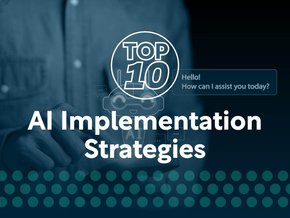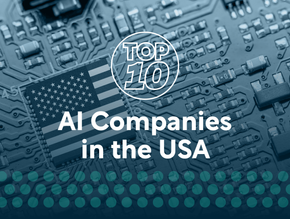Top 10 sectors for machine learning

Machine learning (ML) is transforming industries and the way data is handled. Algorithms are ‘trained’ to find patterns in the vast amounts of data in order to make decisions and predictions based on logic, enabling the machines to learn and to complete the task without any explicit programming. We take a look at 10 sectors using ML.
10: Software development
The market for software development is growing significantly and ML can help with many different processes. Often a worry is a budget and timing, ML can anaylse data from previous projects, such as user stories, forecasts, and provide a more accurate budget estimate.
ML eliminates the need for giving computers the rules for how to make decisions and take actions. A developer prepares data that is fed into learning algorithms and the system discerns important patterns from the data. ML algorithms can even find out patterns or details that the developers haven’t even thought of.
09: Transcription
ML has transformed the transcription industry through software that converts speech to text. By training an Automated Speech Recognition (ASR) engine to a specific domain you can reach very high accuracy.
ML transcription applications can deliver great speed and accuracy, which can save time and money. For example, business managers can utilise ML transcription software for automatically transcribing their emails and minutes of meetings
08: Retail and customer service
The past year has caused a massive shift in this industry as the pandemic has disrupted many traditional practices, this is where ML has become a key enabler of change. ML is helping this sector reinvent its supply chain, inventory management, predicting user behaviour, and analysing trends.
Conversational chatbots are a big development in this industry. Providing an AI-powered 24/7 customer service chat can help handle most queries and transfer customers to live agents when needed. This helps reduce customer service costs and increase customer satisfaction.
07: Marketing
ML can make sense of vast amounts of data much faster and much more effectively than humans, and gives the opportunity for marketers to make crucial decisions based on big data. ML can find patterns in user activities on a website, which can help predict the further behavior of users and quickly optimise advertising offers. An increase in a more personalised and unique customer experience can in turn increase profits.
06: Manufacturing
More manufacturers than ever are leveraging data to significantly improve their production line thanks to AI — and in particular ML.
AI and ML have become more prevalent in producing and assembling items, helping in reducing cost and time of production. ML is important when handling huge amounts of data, and can also help with real-time error detection, supply chain visibility, and asset tracking.
05: Cybersecurity
ML has become a vital technology for cybersecurity and can make your organisation’s security run more smoothly, also freeing up your security team’s time for other important tasks . With ML, cybersecurity systems can analyse patterns and learn from them to help prevent attacks and respond to changing behavior. It can also help cybersecurity teams be more proactive in responding to active attacks in real-time.
04: Agriculture
Technology is transforming the agriculture sector. By feeding machine learning systems with the collected data, farm management can be supported with real-time recommendations elaborated via artificial intelligence.
Farmers can then use data-intensive approaches to allow for better decision-making, greater efficiency, and reduced waste. For example using sensors and ML digital applications farmers can predict harvest yields, evaluate crop quality, detect crop disease and identify plant species.
03: Finance
There are several ways the finance sector is benefiting from ML. For example, algorithmic trading refers to the use of algorithms to make better trade decisions, ML can provide insights allowing investors to identify when to trade. ML can analyse millions of data sets within a short time to improve the outcomes without being specifically programmed to do so. This can help to detect fraudulent transactions and pave the way for a safer and more secure online transaction.
02: Transportation
Often when people think about ML and transportation the first thing they think of is self-driving cars, which could be seen as the future of transportation. The algorithms for such a complex product are being developed for a system to adopt new features like analysing and optimising the data collected from a variety of sources, routing, mapping, and navigating the situations around them in the real world.
ML is also great for collecting traffic data which can be used for a number of different reasons, such as for highway management and roadworks.
01: Healthcare
ML is used for a variety of different reasons in healthcare, and during the pandemic, it has been extremely important. It enables healthcare providers to generate large volumes of data and carry out critical clinical decisions.
ML algorithms can detect patterns associated with diseases and health conditions by studying thousands of healthcare records and other patient data. They can also help detect tumours on scans and identify possible health issues. Wearable devices and sensors that monitor certain things from steps, oxygen levels to heart rates generate a large amount of data that allows doctors to assess their patient’s health in real-time.






